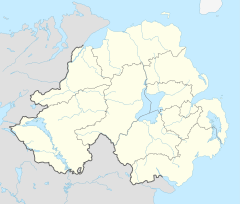Eden Primary School, Carrickfergus
| Carrickfergus | |
|---|---|
 Carrickfergus Castle at sunset |
|
| Carrickfergus shown within Northern Ireland | |
| Population | 27,903 (2011 Census) |
| • Belfast | 11 miles (18 km) |
| District | |
| County | |
| Country | Northern Ireland |
| Sovereign state | United Kingdom |
| Post town | CARRICKFERGUS |
| Postcode district | BT38 |
| Dialling code | 028 |
| Police | Northern Ireland |
| Fire | Northern Ireland |
| Ambulance | Northern Ireland |
| EU Parliament | Northern Ireland |
| UK Parliament | |
| NI Assembly | |
Carrickfergus (from Irish: Carraig Fhearghais, meaning "Fergus's rock"), colloquially known as "Carrick", is a large town in County Antrim, Northern Ireland. It sits on the north shore of Belfast Lough, 11 miles (18 km) from Belfast. The town had a population of 27,903 at the 2011 Census. It is County Antrim's oldest town and one of the oldest towns in Ireland as a whole. Carrickfergus was the administrative centre for Carrickfergus Borough Council, before this was amalgamated into the Mid and East Antrim District Council in 2015, and forms part of the Belfast Metropolitan Area. It is also a townland of 65 acres, a civil parish and a barony.
The town is the subject of the classic Irish folk song "Carrickfergus", a 19th-century translation of an Irish-language song (Do Bhí Bean Uasal) from Munster, which begins with the words, "I wish I was in Carrickfergus".
The British peerage title of Baron Carrickfergus, which had become extinct in 1883, was bestowed upon Prince William on his wedding day in 2011.
The town is said to take its name from Fergus Mór (Fergus the Great), the legendary king of Dál Riata. According to one tale, his ship ran aground on a rock by the shore, which became known as "Carraig Fhearghais" – the rock of Fergus.
...
Wikipedia

